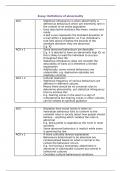Other
AQA A Level Psychology Psychopathology Essay Plans
- Module
- Psychopathology
- Institution
- AQA
Concise, detailed essay plans covering the whole AQA A Level Psychology Psychopathology topic, created and used to achieve an A* in the 2024 Psychology A Level exam series.
[Show more]




